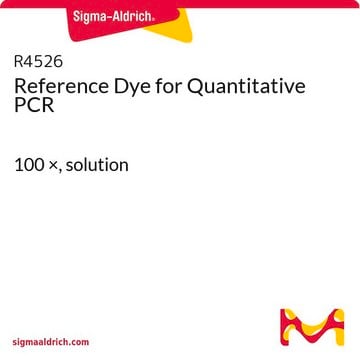S1816
SYBR® Green JumpStart™ Taq ReadyMix™ for Quantitative PCR, Capillary Formulation
SYBR® Green qPCR reagent for Roche LightCycler® capillary systems
About This Item
Recommended Products
form
liquid
usage
sufficient for 100 reactions
sufficient for 400 reactions
feature
dNTPs included
hotstart
concentration
1 units/reaction (20 μL reaction volume)
technique(s)
qPCR: suitable
color
colorless
input
purified DNA
compatibility
for use with Roche LightCycler 480
detection method
SYBR® Green
shipped in
wet ice
storage temp.
−20°C
General description
SYBR Green Taq ReadyMix is recommended for single product real-time amplification experiments and may also be used for evaluation of primer sequences prior to manufacture of fluorescent-labeled probes. Fluorescent labeled probes are not recommended for use with SYBR Green I dye.
Application
Features and Benefits
- Convenient 2× concentrate ReadyMix specifically designed for use with capillary instruments such as the Roche LightCycler® and is ideal for high throughput applications
- Increased specificity & target yield - JumpStart™ Taq polymerase prevents non-specific product resulting in more accurate CT values and improved quantitation
- This master mix allows consistency from one reaction to the next
- Designed to reduce the preparation time and minimize contamination from multiple pipetting steps
- The double-strand DNA-specific SYBR® Green I fluorescent dye is inexpensive, easy to use, and sensitive and is ideal for quantifying any DNA sequence
Packaging
100RXN is packaged as 1 X 1 mL
400RXN is packaged as 1 X 4 mL
Principle
The JumpStart Taq antibody inactivates the DNA polymerase at room temperature. When the temperature is raised above 70 °C in the first denaturation step of the cycling process, the complex dissociates and the polymerase becomes fully active. JumpStart Taq DNA polymerase prevents non-specific amplification resulting in more accurate CT values.
To prepare a reaction, 10 μL of ReadyMix is added to primers, template and water for a final reaction volume of 20 μL.
Unit Definition
Legal Information
related product
Storage Class Code
10 - Combustible liquids
WGK
WGK 1
Flash Point(F)
Not applicable
Flash Point(C)
Not applicable
Choose from one of the most recent versions:
Certificates of Analysis (COA)
Don't see the Right Version?
If you require a particular version, you can look up a specific certificate by the Lot or Batch number.
Already Own This Product?
Find documentation for the products that you have recently purchased in the Document Library.
Customers Also Viewed
Articles
qPCR investigates gene expression, amplification, and alterations, crucial for tumor biology and understanding cancer genetics.
qPCR investigates gene expression, amplification, and alterations, crucial for tumor biology and understanding cancer genetics.
qPCR investigates gene expression, amplification, and alterations, crucial for tumor biology and understanding cancer genetics.
qPCR investigates gene expression, amplification, and alterations, crucial for tumor biology and understanding cancer genetics.
Protocols
A protocol that can be used as a basic template for qPCR incorporating SYBR Green I DNA binding dye that is amenable to modification and applicable for use as validation for a set of primers.
A protocol that can be used as a basic template for qPCR incorporating SYBR Green I DNA binding dye that is amenable to modification and applicable for use as validation for a set of primers.
A protocol that can be used as a basic template for qPCR incorporating SYBR Green I DNA binding dye that is amenable to modification and applicable for use as validation for a set of primers.
Related Content
SYBR® Green I, a commonly used fluorescent DNA binding dye, binds all double-stranded DNA and detection is monitored by measuring the increase in fluorescence throughout the cycle. Explore our LuminoCt® and KiCqStart® products for Fast qPCR or JumpStart™ reagents for conventional qPCR
Our team of scientists has experience in all areas of research including Life Science, Material Science, Chemical Synthesis, Chromatography, Analytical and many others.
Contact Technical Service












